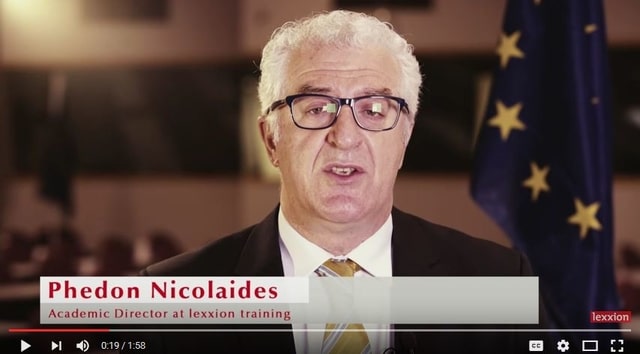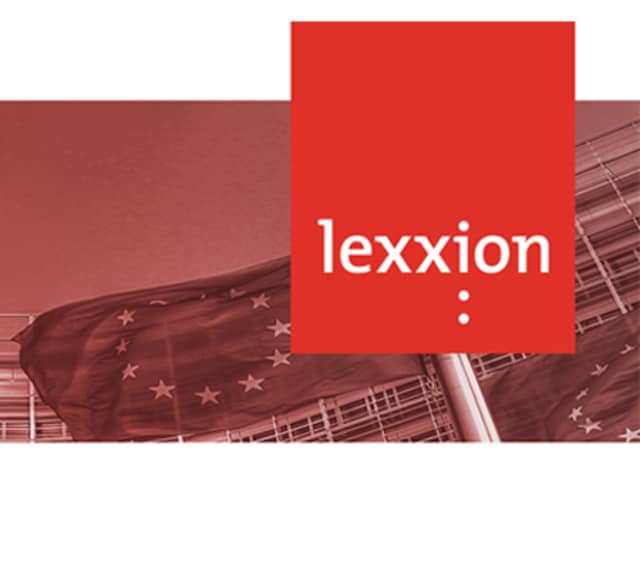Today we are glad to welcome once again Gian Marco Galletti as guest author on our State aid blog. He is a PhD Candidate & EU Law Tutor at the Dickson Poon School of Law of King’s College London. In this blog post he comments on the Commission’s new Notice on the notion of State aid. Thank you for your […]
State Aid Law
Blog
State Aid Uncovered Blog
In Lexxion’s State Aid Uncovered blog, Prof. Phedon Nicolaides publishes weekly critical analyses of recent State aid judgments and decisions. Each post presents the key points of a court judgment or EU Commission decision, places it in the context of similar case law or practice, assesses the underlying reasoning and highlights any inconsistencies or contradictions.
Guest contributions from other State aid experts will also be published on the blog at irregular intervals to complement the content of the blog posts.
22. June 2016 |
Guest State Aid Blog
by Gian Marco Galletti
16. June 2016 |
State Aid Uncovered
by Lexxion Publisher
What is State aid? Why do I need to be concerned about State aid? These and many more basic questions will be answered in our videos on YouTube. Make sure to visit us! Today Phedon Nicolaides tells you, why public authorities should be concerned about Stateaid. Please comment and subscribe. Visit our YouTube Channel and show all videos. You […]
13. June 2016 |
State Aid Uncovered
by Phedon Nicolaides
A state guarantee is presumed to lower borrowing costs. However, any other benefits in relation to customers or suppliers have to be proven. Introduction On 26 May 2016, the General Court rendered its judgment in case T-479/11, France v Commission concerning the IFP.[1] France appealed against Commission decision 2012/26 which found that France granted aid to IFP. IFP iIFP s […]
9. June 2016 |
Guest State Aid Blog
by Lexxion Publisher
What is State aid? Why do I need to be concerned about State aid? What is General Block Exemption Regulation (GBER) and how to use it? These and many more basic questions will be answered in our videos on YouTube. Make sure to visit us! With great pleasure we announce the beginning of a new era of e-learning about […]
7. June 2016 |
State Aid Uncovered
by Phedon Nicolaides
Aid measures that target persons with particular needs and who are not adequately provided by the market are not likely to be found to distort competition contrary to the common interest, even if there is some substitutability between the subsidised services and similar services provided by the market on commercial terms. Introduction In August 2011, the Commission received a […]
2. June 2016 |
Guest State Aid Blog
by Erika Ellyne
We are happy to welcome Erika Ellyne on the State Aid Blog today. She is a lawyer at Van Bael & Bellis law firm where she works on EU competition law matters. Previously she was a researcher at the VUB University and the LSTS research center, where she is still an affiliate. Today she gives her insights on the Frucona […]
1. June 2016 |
Guest State Aid Blog
by Lexxion Publisher
Find below the court’s diary for all State aid cases this month. Would you like to write a comment on one of them? Please don’t hesitate and get in touch with us ([email protected]), we are happy to publish your comment on the blog. Thursday 09/06/2016 Judgment in Case T-162/13 – Magic Mountain Kletterhallen and Others v Commission (General […]
31. May 2016 |
State Aid Uncovered
by Phedon Nicolaides
Arrangements established by law whereby undertakings are compensated for any extra payments they make to producers of green electricity are likely to bring those payments under the control of the state. Those payments will then be classified as state resources regardless of whether they are managed by private entities. Introduction On 10 May 2016, the General Court issued its […]
24. May 2016 |
State Aid Uncovered
by Phedon Nicolaides
State aid is an objective concept. When the Commission assesses a measure it has to examine its effects and cannot be bound by a decision of the Council. A beneficiary of State aid cannot entertain legitimate expectations simply because the Commission does not appear to object to the aid. Introduction On 22 April 2016, the General Court rendered its judgment […]
18. May 2016 |
State Aid Uncovered
by Phedon Nicolaides
A market economy operator undertakes activities whose incremental revenue exceeds their incremental costs. A market economy operator ignores costs which are unaffected by those activities. A service of general economic interest has special characteristics that set it apart from other services with positive impact on the economy. Having a positive impact is not enough. Part II: Public tasks and […]
7. July 2015 |
State Aid Uncovered
by Phedon Nicolaides
The sale of a public undertaking [privatisation] needs to be preceded by independent valuation and be carried out on the basis of a competitive procedure. Certain guarantees may be provided to prospective buyers, if they could increase the sale price. The break-up of an undertaking and the disposal of the different parts through separate sales should be shown to generate […]
29. June 2015 |
State Aid Uncovered
by Phedon Nicolaides
The standard of proof of whether a measure is selective depends on whether that measure is a scheme or a grant of individual aid. Measures providing for exemption are by definition selective. Measures that impose additional charges for the purpose of maintaining equality between operators are not necessarily selective even if the responsible authorities retain a degree of discretion in […]
22. June 2015 |
State Aid Uncovered
by Phedon Nicolaides
Ex post monitoring will be pursued vigorously by the Commission. Irregularities in the implementation of State aid measures may lead to the opening of the formal investigation procedure. Introduction This article examines Commission decision concerning a UK risk capital scheme entitled Enterprise Capital Funds [SA.15373 and SA.33186]. The decision is the outcome of an investigation that was initiated after […]
15. June 2015 |
State Aid Uncovered
by Phedon Nicolaides
At the end of April, the European Commission announced that seven measures were found not to constitute State aid because they could not be reasonably expected to affect cross-border trade. The finding of no affectation of trade is rare. That seven measures were thought not capable of affecting trade is very exceptional. Perhaps the Commission is trying to signal to […]
8. June 2015 |
State Aid Uncovered
by Phedon Nicolaides
Greater use of the new General Block Exemption Regulation means fewer State aid measures subject to notification and ex ante assessment by the Commission. However, less ex ante control will be followed by more ex post control. Member States should be prepared for wider and more intrusive ex post monitoring. Introduction One of the cornerstones of the State Aid […]
1. June 2015 |
State Aid Uncovered
by Phedon Nicolaides
Injection of public capital in an undertaking conforms with the market economy investor principle when: The public investment is equal and concomitant to private investment. The public investment has economic significance and is not followed by disengagement of private investors. The recipient undertaking is in a healthy financial position. The recipient undertaking compares favourably to its peers. The investment is […]
27. May 2015 |
State Aid Uncovered
by Phedon Nicolaides
Restructuring aid can finance any part of a restructuring plan. Compensatory measures initiated before the granting of restructuring aid can be taken into account as long as they are linked to the restructuring itself. Member States have to comply with the conditions defined in Commission decisions. They cannot justify non-compliance on the grounds of domestic institutional difficulties. Regional authorities that […]
19. May 2015 |
State Aid Uncovered
by Phedon Nicolaides
Even efficient companies will fail the 4th Altmark criterion if their costs are not proven to be comparable to those of a typical and well-equipped undertaking. Public funding of infrastructure is not State aid to users only if access is open to all. Public funding for training to raise social awareness is still State aid if it relieves companies of […]
12. May 2015 |
State Aid Uncovered
by Phedon Nicolaides
Where there is a constitutional division of tax competences, different authorities may tax similar activities at different rates. Introduction This article examines Commission decision SA.34469 on differential tax rates for online and land-based gambling in Spain.[1] In the Spanish political system, regions that have the status of Autonomous Communities have powers of taxation. The issue at hand was which authority […]
6. May 2015 |
State Aid Uncovered
by Phedon Nicolaides
In managing infrastructure, a public authority acts as a private operator when it seeks a reasonable return on its investment and also takes into account the alternative of not operating the infrastructure. The manager of an infrastructural project may charge different fees to different users to optimise usage and increase revenue. Introduction This article reviews Commission decision 2015/506 concerning […]























